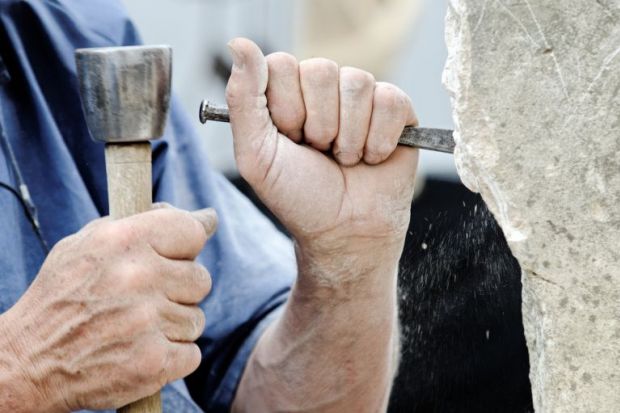In Thomas Hardy’s novel Jude the Obscure, Jude Fawley spends his early adulthood working as a stonemason’s apprentice by day while poring over maths textbooks and Latin by night, dreaming of an education at “Christminster”, a replica of Oxford in the late 19th century.
The elitism he faces in the city while dealing with personal misfortunes and missteps leaves him disillusioned, and by the end of the novel he has turned his back on the dream of higher education.
Hardy was a former apprentice himself and proud son of the South West, with a great understanding of the social and educational challenges in a changing society. Almost 100 years after Hardy’s death, we are still working hard to ensure higher education is genuinely accessible to all. At the University of Exeter, and across the UK, an option that is rapidly growing in popularity and revolutionising that seemingly binary choice between earning and learning is degree apprenticeships – giving people of all ages and backgrounds an opportunity to access both the skills and the financial support they need to succeed.
The higher education landscape has obviously changed beyond measure since Hardy’s death in 1928. More young people from more diverse backgrounds than ever before are going to university, which remains the gold standard for graduate success. Universities know more, and do more, to widen access and opportunity for all. But amid all these changes, some challenges endure. And so, if we want to achieve the government’s new mission to “break down the barriers to opportunity for every child, at every stage and shatter the class ceiling” then we must also change the mindset of the public and policymakers of how one can access a university education.
The work we have done at Exeter on degree apprenticeships shows that learning which combines high-quality academic learning and rigorous skills training, developed in partnership with employers and students, is a win for everyone, including the country. Students benefit because they can earn and learn at the same time with greater financial and job security; employers benefit because they are guaranteed the skills and people they need; and the country benefits because we widen opportunity for all, develop new talents and support the specific skills businesses need for economic growth and stability.
And yet, currently only 10 per cent of degree apprenticeship students study at the UK’s Russell Group universities. Part of this is down to the logistical and bureaucratic burden of creating an effective degree apprenticeship offer: our experienced Centre for Degree Partnerships has been invaluable in brokering partnerships with over 200 different employers. So why do we do it?
The answer lies in the evidence that degree apprenticeships can be transformative for individuals and wider social mobility, and the South West region needs this more than most. Research from Ucas and the Sutton Trust shows that students from lower socio-economic backgrounds are more likely to hear about and seek out apprenticeship opportunities. And yet, one in three apprentices receive no support with their application, just 4 per cent see apprenticeships as “prestigious” compared with 76 per cent for undergraduate degrees, and three in five former applicants do not pursue apprenticeships because they can’t find one in their preferred location.
Parts of the South West are some of the most deprived in the UK, and people from our communities are on the wrong end of a skills gap. Work from our South West Social Mobility Commission has shown that our region has the lowest proportion of under‐resourced young people going on to higher level (level 4+) qualifications – just 51 per cent compared with 68 per cent nationally.
Degree apprenticeships help to resolve this skill, productivity and aspiration gap without taking learners away from the broader opportunities that universities provide. That’s why we want to double our number of degree apprenticeships by 2030, working with more national organisations such as BT and the NHS along the way, as well as small businesses here in the region.
The personal stories I hear from our degree apprentices are powerful and compelling testament to this innovative approach to developing skills and opportunity. From single parents and young people who thought that a high-quality university education was out of their reach to people of any age who have been held back from fulfilling their potential or think it’s too late to change course – degree apprenticeships are transforming their lives and with them the prospects of our great nation.
The diversity of our degree apprenticeship students is one of our greatest strengths: about 40 per cent of our degree apprentices are mature students, with 60 per cent of our places going to apprentices under the age of 21. And 45.6 per cent of our degree apprentices are the first in their family to study at a university; 11 per cent of our degree apprenticeship cohort are from the areas of the highest deprivation as measured by the Index of Multiple Deprivation, and 8.3 per cent were previously eligible for free school meals.
Degree apprentices now make up about 10 per cent of our overall student body, and contribute to all aspects of student life while also making vital contributions to the local workforce. We need more people to take degree apprenticeships, not fewer, to genuinely break down barriers to opportunity.
But to realise these ambitions, we need change. Polling shows that apprenticeships are high on people’s priority lists when it comes to education spending, but we need government policy that provides stability, clarity and protection for the full range of apprenticeship options. Degree apprenticeships are hugely popular with both students and employers, with evidence that they support greater social mobility and new essential skills within communities. Financially, they benefit apprentices, businesses and universities – and therefore the taxpayer at a time of constrained budgets and when every penny counts. We stand ready to work with the government, employers and partners across the UK to ensure degree apprenticeships become the engine of change and innovation that our country needs.
In the UK we have removed many of the barriers to education and opportunity that Hardy’s hero Jude endured, and we should erase the unnecessary dividing lines between degrees and apprenticeships and the false choice between learning and earning. Degree apprenticeships can be a cornerstone of social mobility throughout the UK and provide the skills our employers tell us they need.
I’m proud of the start we have made at Exeter. We have potential to achieve so much more – in delivering skills to grow the economy, in powering social mobility and opening up opportunity to all.
Lisa Roberts is vice-chancellor of the University of Exeter.
Register to continue
Why register?
- Registration is free and only takes a moment
- Once registered, you can read 3 articles a month
- Sign up for our newsletter
Subscribe
Or subscribe for unlimited access to:
- Unlimited access to news, views, insights & reviews
- Digital editions
- Digital access to THE’s university and college rankings analysis
Already registered or a current subscriber?








